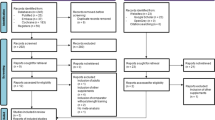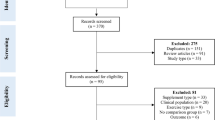Abstract
Background
Older individuals present reductions in muscle mass and physical function, as well as a blunted muscle protein synthesis response to amino acid administration and physical activity. Although resistance training is an effective intervention to slow down muscle impairments in the elderly, there is no consensus whether a combination with protein supplementation could offer additional benefits to an older population.
Objective
We aimed to systematically summarize and quantify whether protein supplementation could optimize the effects of resistance training on muscle mass and strength in an aged population.
Design
A structured literature search was conducted on MEDLINE (PubMed), Cochrane, EMBASE and LILACS databases. The search had no period or language restrictions. Inclusion criteria comprised study design (randomized controlled trials—RCTs), sample mean age (60 years and over) and intervention (a resistance training program for a period of 6 weeks or longer combined with protein or amino acids supplementation). Two independent reviewers performed the study selection and data extraction. Continuous data on fat-free mass, muscle mass and muscle strength were pooled using a random-effects model.
Results
Of the 540 articles reviewed, 29 eligible articles underwent full-text evaluation. Nine RCTs (462 subjects) met the inclusion criteria and were included in the study. The mean age of the participants ranged from 61 to 79 years old. Protein supplementation protocols varied widely throughout the studies. Three studies used quantities related to the body mass of the participants and the other six trials provided supplements in daily amounts, independently of subjects’ body masses. Overall, protein supplementation in combination with resistance training was associated with gains in fat-free mass, resulting in a standardized mean difference (SMD) of 0.23 [95 % confidence interval (CI), 0.05–0.42]. However, protein supplementation was not associated with changes in muscle mass (0.14, 95 % CI −0.05 to 0.32) or muscle strength (0.13, 95 % CI −0.06 to 0.32).
Limitations
Studies among the very elderly population are scarce. The variation regarding the supplementation protocol, namely the different protein sources, amounts and timing of ingestion, also made it harder to compare the results. The general quality of the studies was low, reflecting increased risk of bias in some studies. Despite these limitations, this systematic review provides a general overview of the role of protein supplementation with no other added macronutrients to augment muscle mass and strength during resistance training in older adults.
Conclusion
Combining protein supplementation with resistance training is effective for eliciting gains in fat-free mass among older adults, but does not seem to increase muscle mass or strength.




Similar content being viewed by others
References
Bemben MG, Witten MS, Carter JM, et al. The effects of supplementation with creatine and protein on muscle strength following a traditional resistance training program in middle-aged and older men. J Nutr Health Aging. 2010;14(2):155–9.
Shin H, Panton LB, Dutton GR, Ilich JZ. Relationship of physical performance with body composition and bone mineral density in individuals over 60 years of age: a systematic review. J Aging Res. 2011;2011:1–14.
Geirsdottir OG, Arnarson A, Ramel A, et al. Dietary protein intake is associated with lean body mass in community-dwelling older adults. Nutr Res. 2013;33(8):608–12.
Cermak NM, Res PT, De Groot LC, et al. Protein supplementation augments the adaptive response of skeletal muscle to resistance-type exercise training: a meta-analysis. Am J Clin Nutr. 2012;96(6):1454–64.
Malafarina V, Uriz-Otano F, Iniesta R, Gil-Guerrero L. Effectiveness of nutritional supplementation on muscle mass in treatment of sarcopenia in old age: a systematic review. J Am Med Dir Assoc. 2013;14(1):10–7.
Haub MD, Wells AM, Tarnopolsky M, Campbell WW. Effect of protein source on resistive-training-induced changes in body composition and muscle size in older men. Am J Clin Nutr. 2002;76(3):511–7.
Campbell WW, Leidy HJ. Dietary protein and resistance training effects on muscle and body composition in older persons. J Am Coll Nutr. 2007;26(6):696–703.
Deibert P, Solleder F, König D, et al. Soy protein based supplementation supports metabolic effects of resistance training in previously untrained middle aged males. Aging Male. 2011;14(4):273–9.
Wolfe RR, Miller SL, Miller KB. Optimal protein intake in the elderly. Clin Nutr. 2008;27(5):675–84.
Leenders M, Verdijk LB, van der Hoeven L, et al. Protein supplementation during resistance-type exercise training in the elderly. Med Sci Sports Exerc. 2013;45(3):542–52.
Verdijk LB, Jonkers RAM, Gleeson BG, et al. Protein supplementation before and after exercise does not further augment skeletal muscle hypertrophy after resistance training in elderly. Am J Clin Nutr. 2009;89(2):608–16.
Moher D, Liberati A, Tetzlaff J, Altman DG; The PRISMA Group. Preferred reporting items for systematic reviews and meta-analyses: the PRISMA statement. PLoS Med. 2009;6(7):e1000097. doi:10.1371/journal.pmed.1000097.
Nelson ME, Rejeski WJ, Blair SN, et al. Physical activity and public health in older adults: recommendation from the American College of Sports Medicine and the American Heart Association. Med Sci Sports Exerc. 2007;39(8):1435–45.
Campbell WW, Crim MC, Young VR, et al. Effects of resistance training and dietary protein intake on protein metabolism in older adults. Am J Physiol. 1995;268(6):1143–53.
Candow DG, Chilibeck PD, Facci M, et al. Protein supplementation before and after resistance training in older men. Eur J Appl Physiol. 2006;97(5):548–56.
Chalé A, Cloutier GJ, Hau C, et al. Efficacy of whey protein supplementation on resistance exercise-induced changes in lean mass, muscle strength, and physical function in mobility-limited older adults. J Gerontol A Biol Sci Med Sci. 2013;68(6):682–90.
Iglay HB, Apolzan JW, Gerrard DE, et al. Moderately increased protein intake predominately from egg sources does not influence whole body, regional, or muscle composition responses to resistance training in older people. J Nutr Health Aging. 2009;13(2):108–14.
Kim HK, Suzuki T, Saito K, et al. Effects of exercise and amino acid supplementation on body composition and physical function in community-dwelling elderly Japanese sarcopenic women: a randomized controlled trial. J Am Geriatr Soc. 2012;60(1):16–23.
Kukuljan S, Nowson C, Sanders K, Daly RM. Effects of resistance exercise and fortified milk on skeletal muscle mass, muscle size, and functional performance in middle-aged and older men: an 18-mo randomized controlled trial. J Appl Physiol. 2009;107(6):1864–73.
Tieland M, Dirks ML, van der Zwaluw N, et al. Protein supplementation increases muscle mass gain during prolonged resistance-type exercise training in frail elderly people: a randomized, double-blind, placebo-controlled trial. J Am Med Dir Assoc. 2012;13(8):713–9.
Burd NA, Gorissen SH, van Loon LJC. Anabolic resistance of muscle protein synthesis with aging. Exerc Sport Sci Rev. 2013;41(3):169–73.
Carbone JW, McClung JP, Pasiakos SM. Skeletal muscle responses to negative energy balance: effects of dietary protein. Adv Nutr. 2012;3:119–26.
Cuthbertson D, Smith K, Babraj J, et al. Anabolic signaling deficits underlie amino acid resistance of wasting, aging muscle. FASEB J. 2005;19(3):422–4.
Koopman R, van Loon LJC. Aging, exercise, and muscle protein metabolism. J Appl Physiol. 2009;106(6):2040–8.
D’Souza RF, Marworth JF, Figueiredo VC, et al. Dose-dependent increases in p70S6K phosphorylation and intramuscular branched-chain amino acids in older men following resistance exercise and protein intake. 2014;2(8):e12112. doi:10.14814/phy2.12112.
Phillips S. Protein consumption and resistance exercise: maximizing anabolic potential. Sport Sci. 2013;26(107):1–5.
Acknowledgments
This study was partially funded by Fundação de Amparo à Pesquisa do Estado do Rio Grande do Sul (FAPERGS - Brazil), protocol number 1760-2551/12-3, and Coordenação de Aperfeiçoamento de Pessoal de Nível Superior (PNPD 2818/2011, CAPES-Brazil). Sponsors had no role in the study design; collection, analysis and interpretation of data; the writing of the report; and the decision to submit the paper for publication. Authors had full access to the analyzed data in the study and take responsibility for the integrity of the data and the accuracy of data analysis. No conflicts of interest are declared by the authors.
The manuscript does not contain clinical studies or patient data.
Author information
Authors and Affiliations
Corresponding author
Electronic supplementary material
Below is the link to the electronic supplementary material.
Rights and permissions
About this article
Cite this article
Finger, D., Goltz, F.R., Umpierre, D. et al. Effects of Protein Supplementation in Older Adults Undergoing Resistance Training: A Systematic Review and Meta-Analysis. Sports Med 45, 245–255 (2015). https://doi.org/10.1007/s40279-014-0269-4
Published:
Issue Date:
DOI: https://doi.org/10.1007/s40279-014-0269-4




